Published on: June 1, 2023 Updated on: January 12, 2024
11 Best AI Music Generators: Ultimate Guide to Automated Music
Author: Inge von Aulock

Artists in the music industry are quickly moving from the fear of being replaced by AI as they realize the potential these tools have to help them in their craft. AI music generators can help with the creation, personalization, and monetization of your content.
You know how good Spotify or YouTube Music is at learning what you enjoy listening to? Well, an AI music generator uses similar deep learning and machine learning algorithms to create completely original music. And they’re getting really good at it too.
Looking for some inspiration for a new track with a specific feel or genre? AI music tools can do that for you. Want some original license-free music for your YouTube video? AI can generate music in seconds.
We experimented with 11 of the best AI music generators to see what they’re capable of. We look at the pros and cons as well as the different pricing options. Some of these platforms are for people with limited musical ability, while others offer more professional functionality.
Let’s make some AI music tracks.
1. Evoke Music
Evoke Music is an AI music generator that offers access to a library of original music and sound effects created by AI. Create music easily if you need to include it in a video or social media post but don’t have the time to make it.
They’ve already made about 60,000 music tracks using AI and have made their library extremely search-friendly.
If you’re looking for music with a specific mood, genre, or even a specific instrument, you can find and download it really fast on Evoke. We like that there is a lot of music with “real” instruments in addition to the usual electronic AI music. As we all know, sound is important.
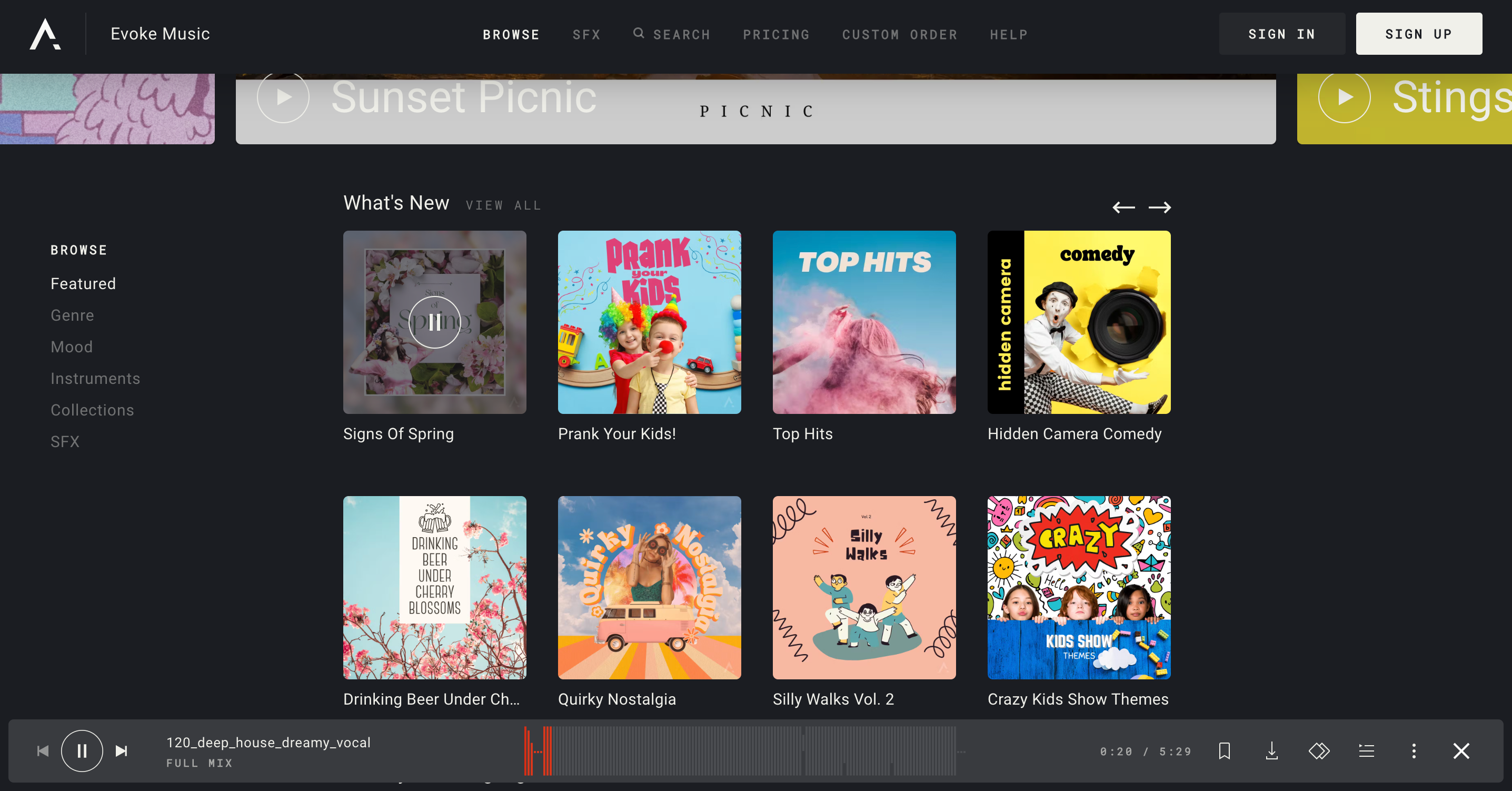
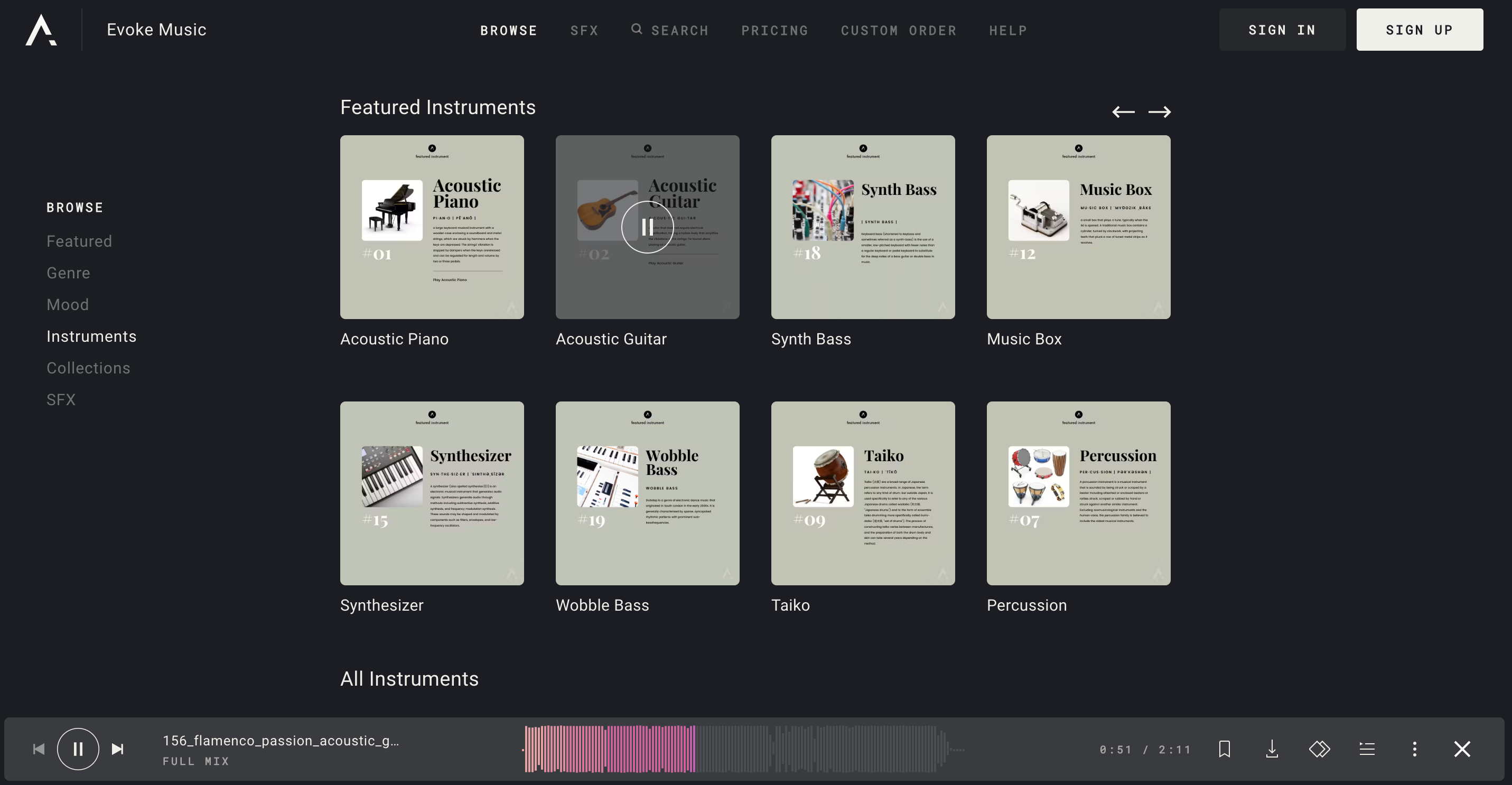
Pros
- An easily searchable library of 60,000 tracks and sound effects
- Huge variety of genres
- Not just electronica but real instrumental music, too
Cons
- Doesn’t let you generate your own AI music
- Can’t edit tracks on the platform
- Commercial licensing is not available on the Personal plan
Anyone who has a fair idea of the type of music they’re after is bound to find something close to that in this huge AI music library.
The pricing starts at $8/month for personal use and $20 per month if you plan to use it commercially.
2. Staccato
If you’ve got a great tune but need some catchy lyrics to go with it, Staccato can help. This kind of music generation is a little different. It uses AI to write lyrics for songs. It can write lines for you, but it’s best to think about it as an AI songwriting assistant best used when you’re stuck creatively.
You can ask it for some ideas or start it off with a line yourself. It will offer a few options for the next line or even just suggestions for words that rhyme to inspire you. If you’ve got a line, but it doesn’t sound quite right, you can get Staccato to rewrite it for you.
Their music generator allows you to upload a Midi file, tweak a few settings, and then generate what it thinks should be the next piece of the music track. This is really helpful if you have a collection of existing songs but don’t know how to make them that little bit more special.


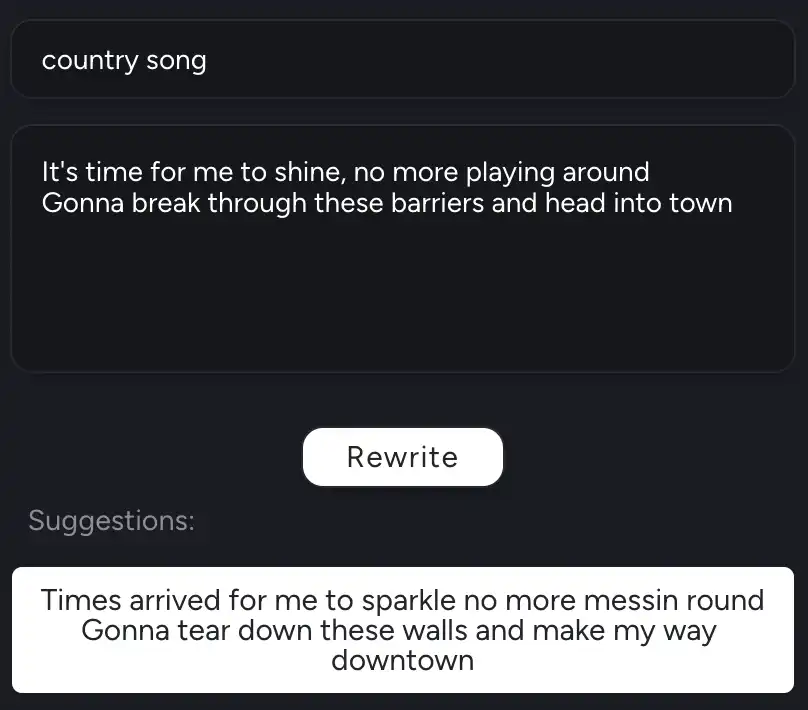
Pros
- Speeds up songwriting process with lyrics suggestions
- Integrates with notation software like Finale and Sibelius
- Generates “what comes next” music suggestions for your unfinished track
Cons
- Doesn’t generate entire musical arrangements from scratch
- No free trial
Most AI music generators don’t help with lyrics, so this is a great option for generating ideas for song lyrics or guiding you in new creative directions. It’s not going to replace your creative process, but it can shorten your songwriting time dramatically.
If you just want the AI lyrics option, it’ll cost you $7.99/month, while the AI music generation plan is $4.99. Or you can opt for unlimited use of both tools at $11.99/month.
3. GetSound
GetSound uses AI to create what they call “Soundscapes.” It generates background sounds and music that change with location, weather, time of day, and other factors. They claim that the ambient music they create promotes relaxation and wellness.
If you’ve got a yoga studio or a coffee shop and you’re trying to create music to induce a relaxing atmosphere, this is an innovative way to use AI to do it.
This is a different kind of AI music generator. It’s not music in the traditional sense but more a mix of ambient music and natural sound effects like rustling leaves or flowing water.
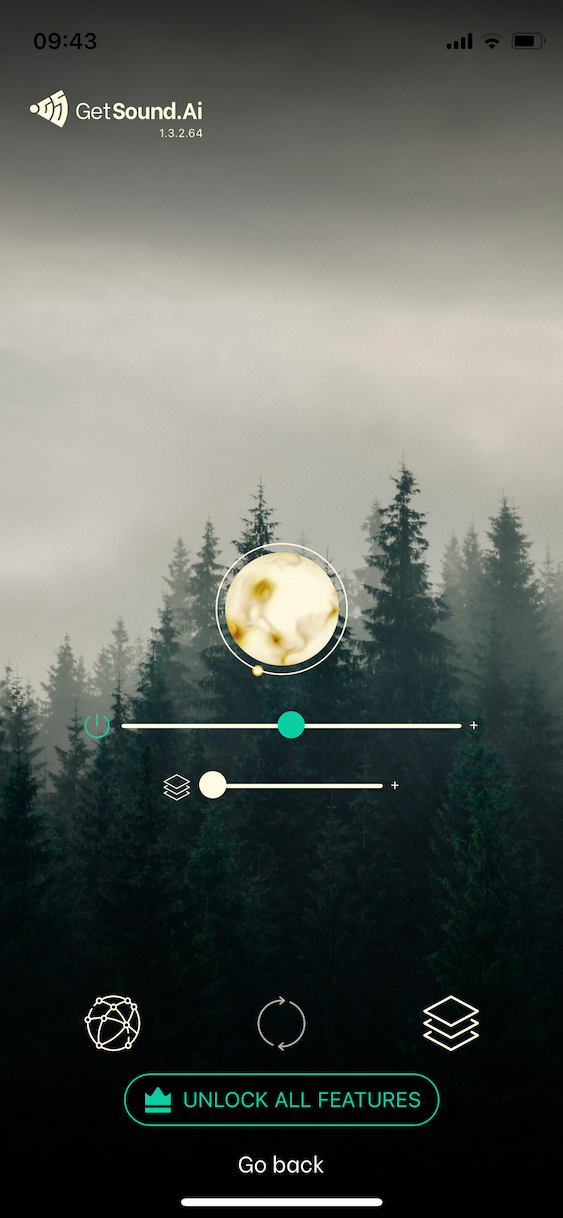
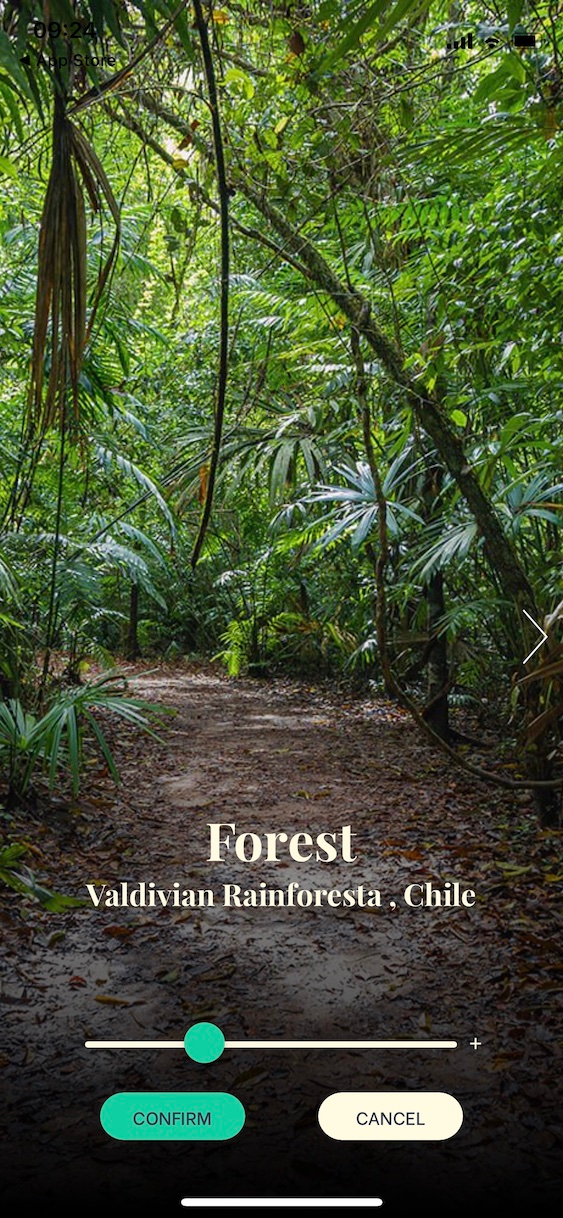
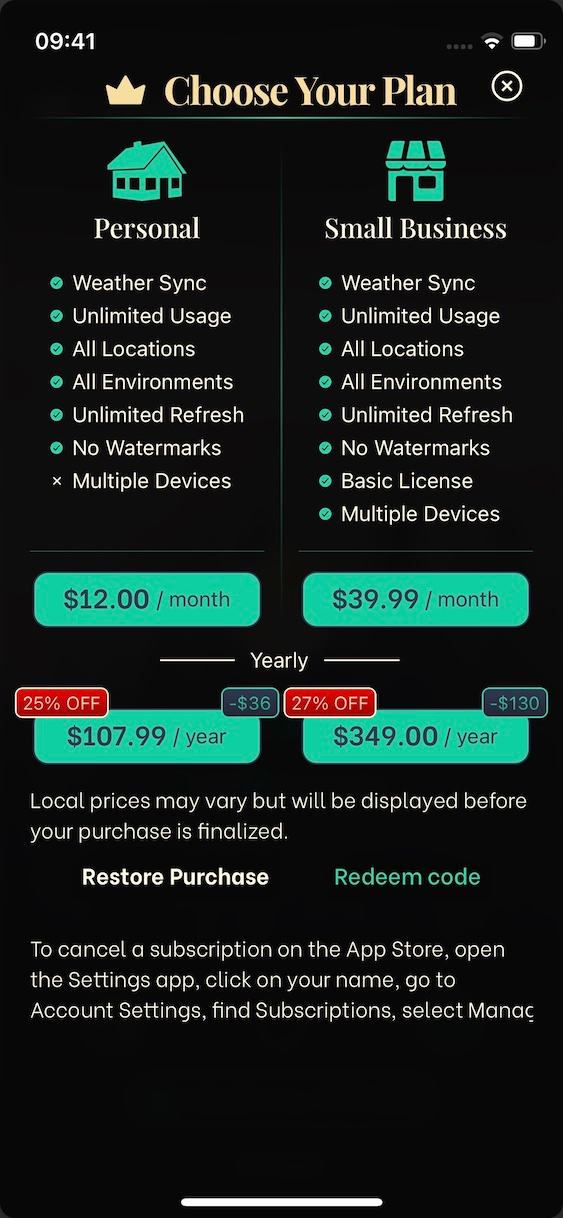
Pros
- Creates unique, relaxing background music
- Very easy to use
- Ideal for coffee shops, studios, or office spaces
Cons
- Can’t download the music. Streaming only.
- Desktop apps are not available yet
GetSound feels like a work in progress. It’s a cool idea as far as AI music generators go, and the way it uses your location and weather conditions with the AI is interesting. The desktop apps aren’t available yet, but the mobile app works well, and the music and sounds are really chilled. Less hip-hop and more ambient vibes.
You can try out the free demo on the app to generate music and decide whether you think it’s earned its spot among the best AI music generators. The pricing isn’t updated on their website, but the app gives you the option of $12/month for personal use or $39.99 for business use.
4. CassetteAI
Cassette is described as a co-pilot for music creation. It uses Latent Diffusion Models (LDM) to understand music patterns, trends, and styles to generate music and unique songs. What makes it different from other AI music generators is that you can use a text prompt to describe what you want it to create.
Cassette allows you to describe the mood, genre, tempo, track length, and instrumentation you want to be included. So if you’ve got your mind on existing songs as a reference, you can simply describe it to replicate it. Below is an example from Cassette’s Twitter account of what it can do. You can check it out here on their feed.
Prompt: A synthy 80s inspired beat, bpm of 130 in minor key that is upbeat with electronic Instruments

If you want to try using Cassette’s AI music generator, you’ll need to hop on their waiting list. Currently, there are around 1580 people on the list. We weren’t able to get access yet but will update this once we do.
The samples and prompts on their website give you a good idea of what they’re able to do, though. It’s more focused on hip-hop and electronic-type sounds, so it’s not one of the most universal AI music generators.

Pros
- Music creation using a text prompt
Cons
- No pricing or instant access to the platform yet
Text-to-music generation sounds like a really cool idea. If we see the same kind of progression in the quality of output that we saw with AI text-to-image tools, then we’re likely to hear some of the best AI music pretty soon.
5. Lemonaid
Lemonaid is an AI-generated music software tool created by musicians for musicians. The tool works like a musical co-producer with some good ideas to get your next track started and it helps generate some of the best AI music out there.
Start with one of 500,000 melodies, add chords, and then choose from one of 500,000 drum patterns. Choose a mood from Energetic, Dark, Uplifting, or Chill, and then click “Generate.” The advanced settings give you further options like choosing the key for your track.
If you have experience in creating and producing your own music, this is a great AI-generated music tool to start with. It won’t write the whole track for you but will deliver “starting seed” ideas for inspiration.
Musicians will love that it integrates with popular Digital Audio Workstation (DAW) tools like Logic Pro X, Ableton Live, FL Studio, and Garage Band.
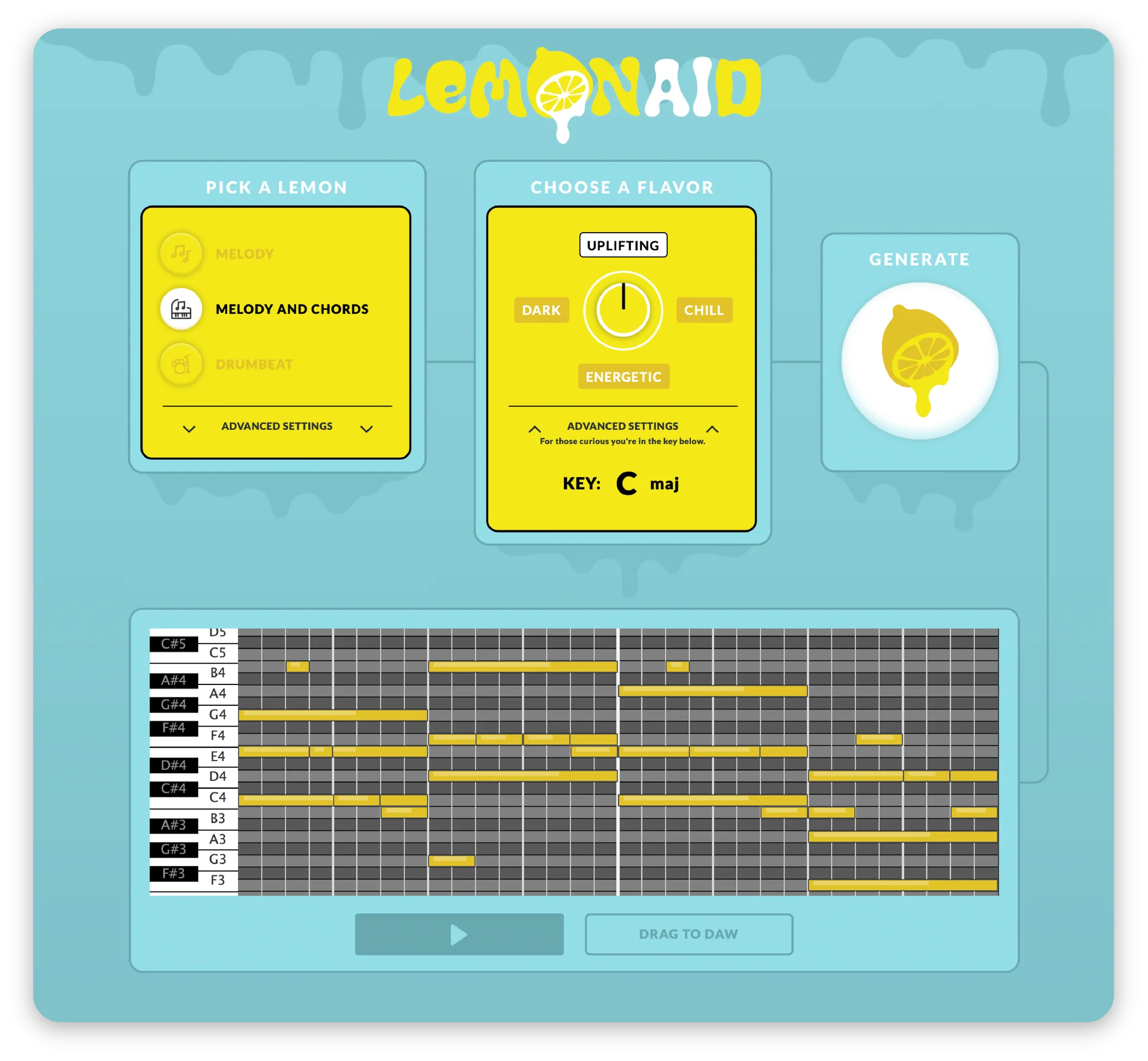
Pros
- Capable of 50 million unique MIDI progressions
- Highly customizable track settings
- Integrates with popular DAWs
Cons
- Not a good tool for newbies
- A little pricey
If you’re in the music business, the once-off price of $69.99 is probably justifiable for the time it’ll save you. If you just want to make some music for your social media post or a YouTube video, then this is not the right tool for you.
6. Soundful
Soundful is an AI music generator that is ideal for creating music that’s short or catchy – think sound loops. Simply select a genre and template, then input the tempo and musical key. With a click of the “Create Preview” button, you’ll have a unique track that has never been heard before.
It’s got a strong focus on hip-hop sounds and electronic music, and we managed to quickly generate some decent Drum and Base tracks as well as some chilled-out LoFi tunes. Soundful is a good option if you want AI to deliver a complete track but you want to retain some measure of control.
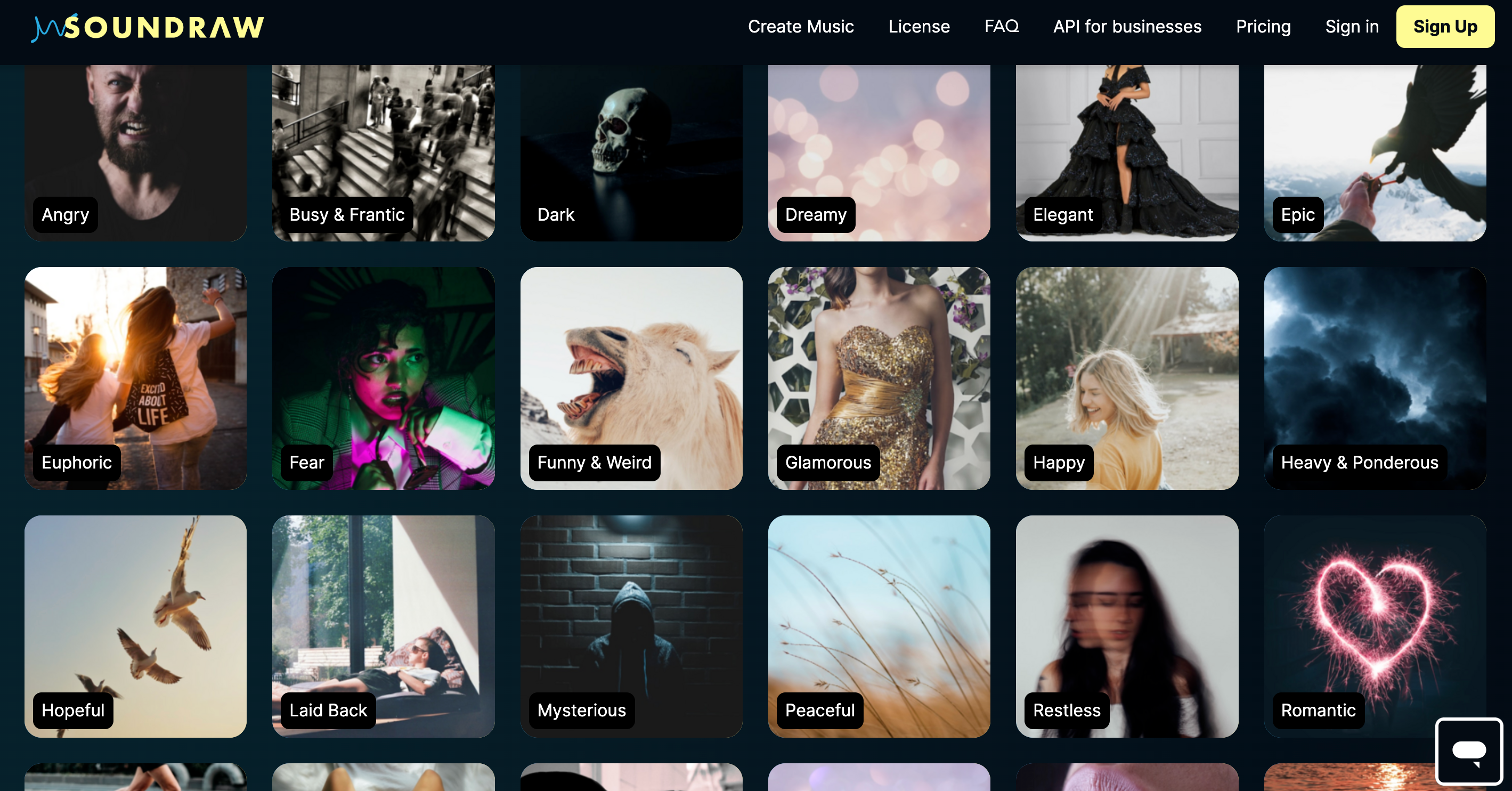
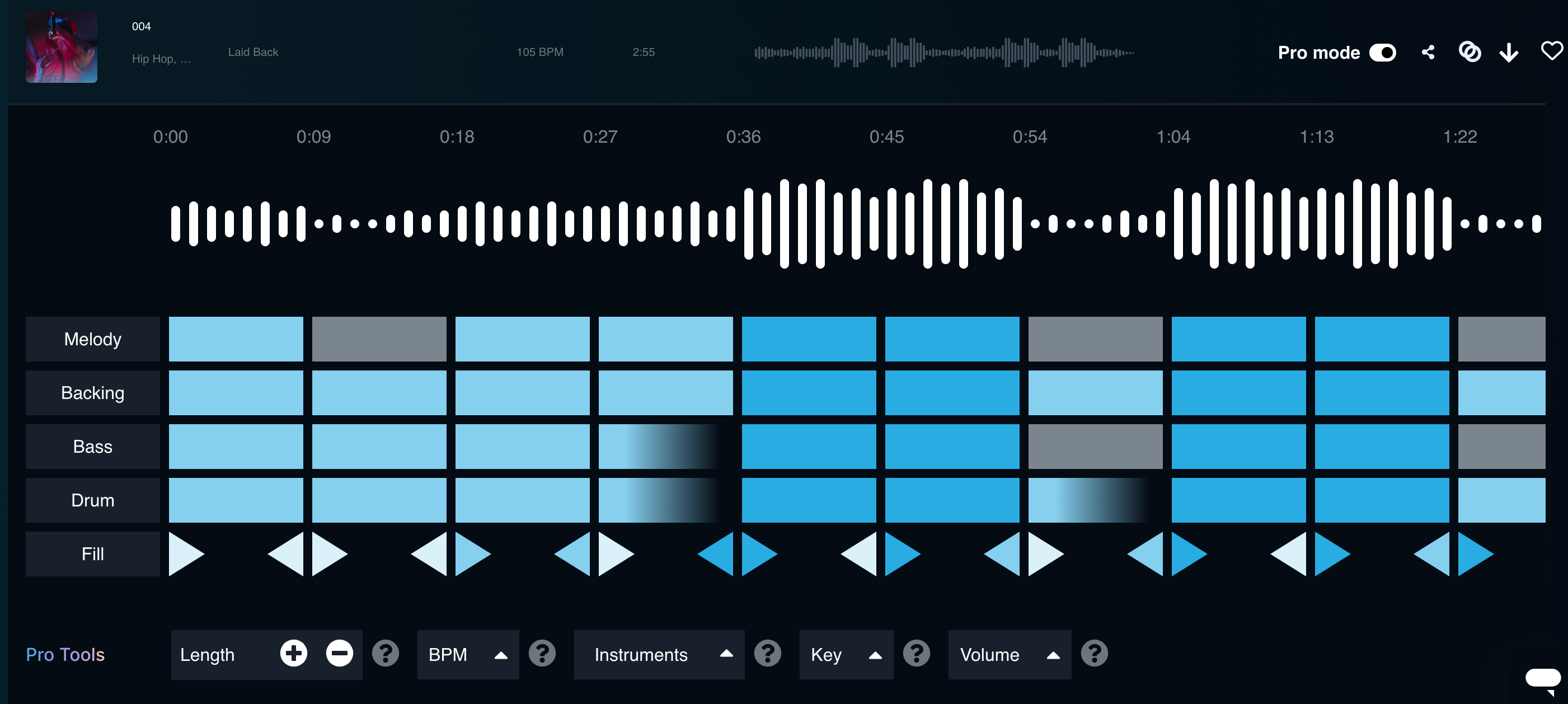
Pros
- Offers an extensive range of genres, templates, tempo, and key options
- User-friendly interface for a seamless experience
- Free plan for personal users to create music
Cons
- The Standard plan requires attribution to Soundful in your social media posts
- Tracks created on the Standard plan cannot be used in monetized videos
If you’re looking for a cool hip-hop background track for your TikTok posts or Instagram reels, Soundful should be your go-to tool. It’s super easy to use, and you can get great-sounding music even as a novice. The $9.99 Premium plan is a good deal if you want to use the music in monetized content.
7. AIVA
AIVA is a powerful AI music generator and editor. If you’re a professional musician and you want some AI help with your next orchestral composition, AIVA is the tool for you.
You start by choosing one of the preset themes or uploading your own MIDI file to use as an influence for the AI. AIVA will generate a piece of music based on these, coupled with the other customization options you select.
Once the track is generated, you can use their built-in editor for granular editing of the tracks. This is the most complex AI music editor we saw in the tools we reviewed.
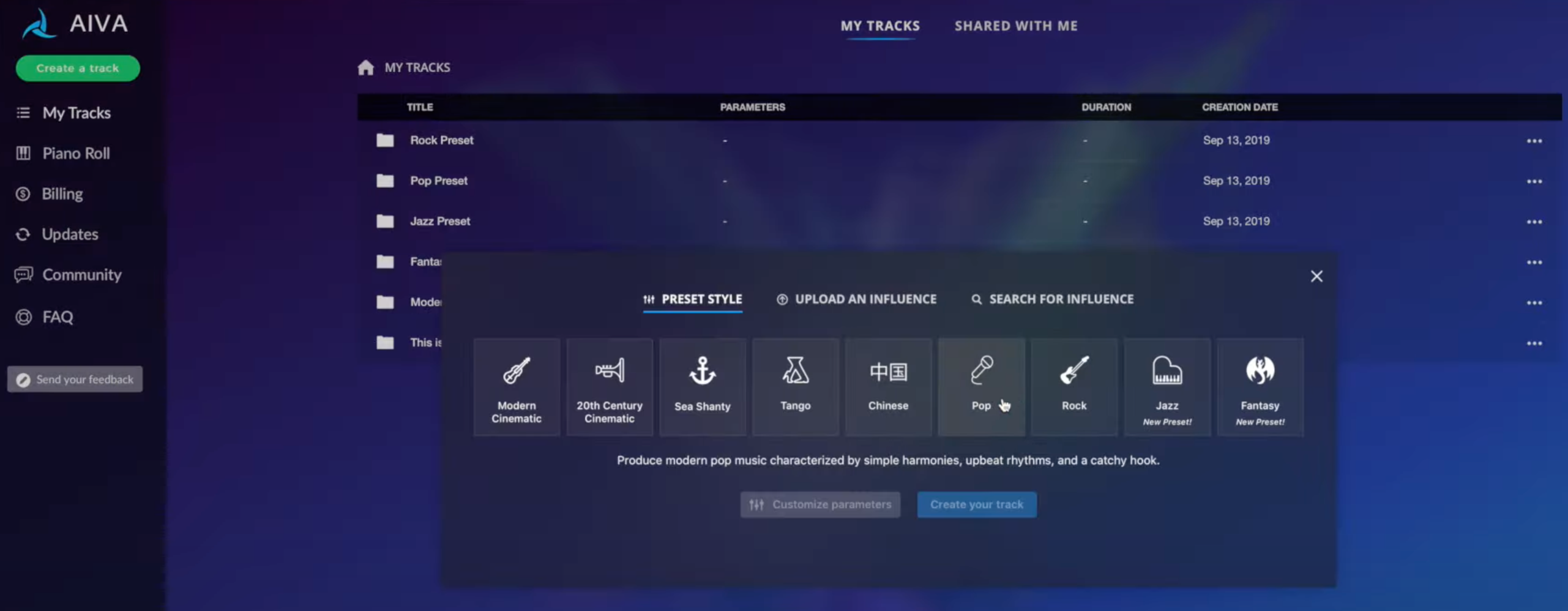
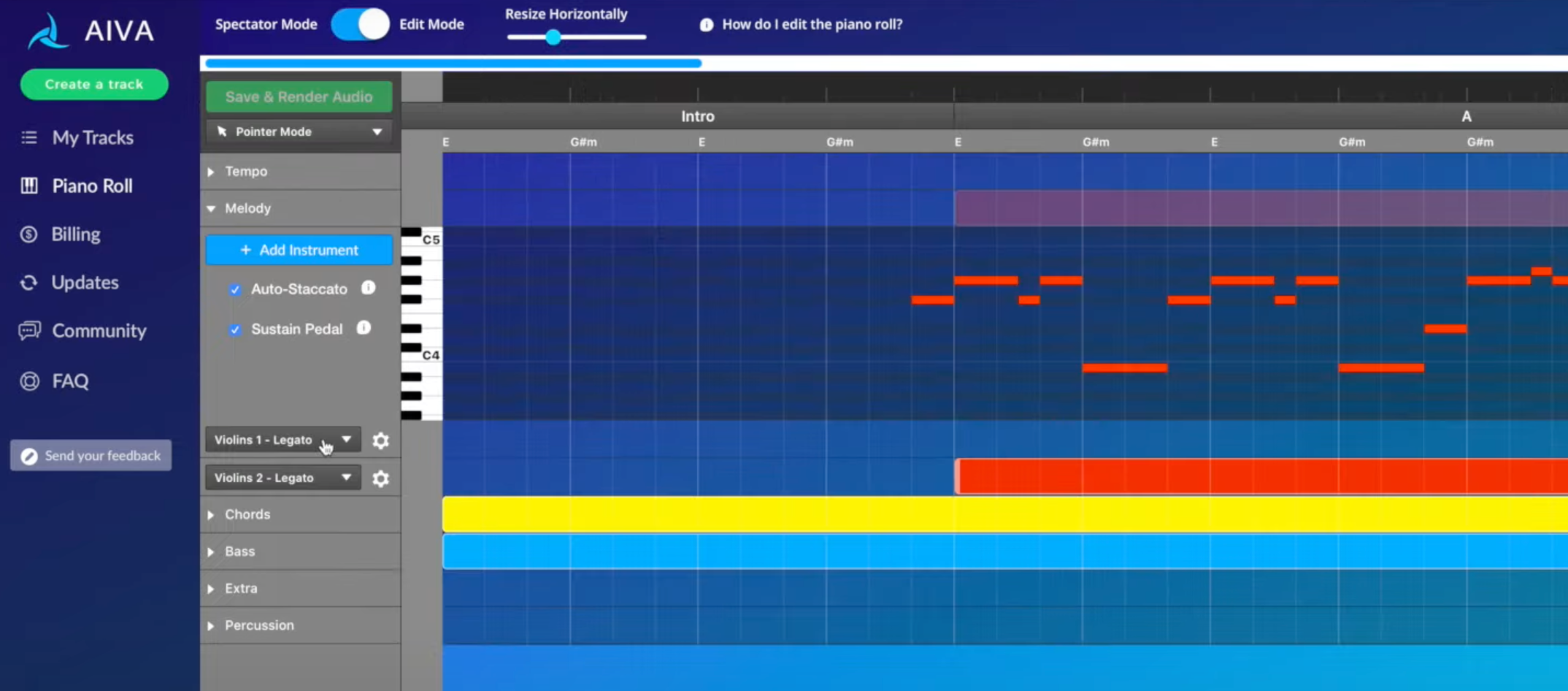
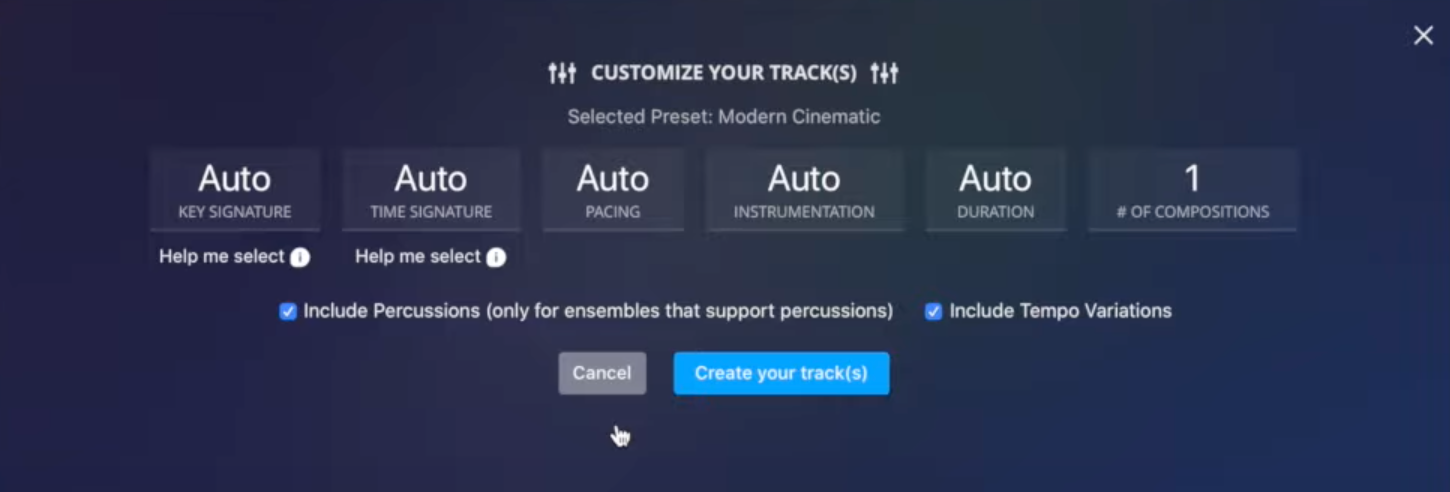
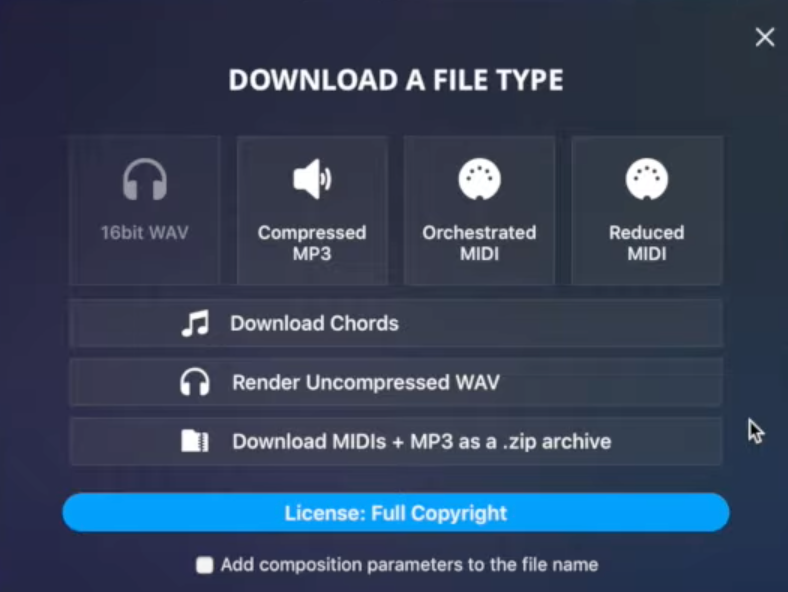
Pros
- Generates beautiful tracks from a wide variety of themes
- Lets you use an existing track as a seed for your AI track
- High degree of music editing options – Pro musician tool
Cons
- Not a good tool for beginners
They have a free plan, so even if you’re a beginner, you could give it a go, but this is more of a pro tool. It’s a good alternative to MuseNet. If you want detailed control over the tracks you produce and monetization rights, then the €15/month is worth it.
8. Ecrett
Ecrett is an AI music generator that hits the sweet spot between being easy to use and offering a decent amount of customization settings. If you’re a novice, then simply select a mood, a genre, and a scene and click “Create Music” to get your track.
If you want to tinker under the hood, the editing options let you change the instrument settings as well as the structure of the track. You can change the tempo and the individual volumes of the musical components, too, for more original-sounding AI-generated music tracks.
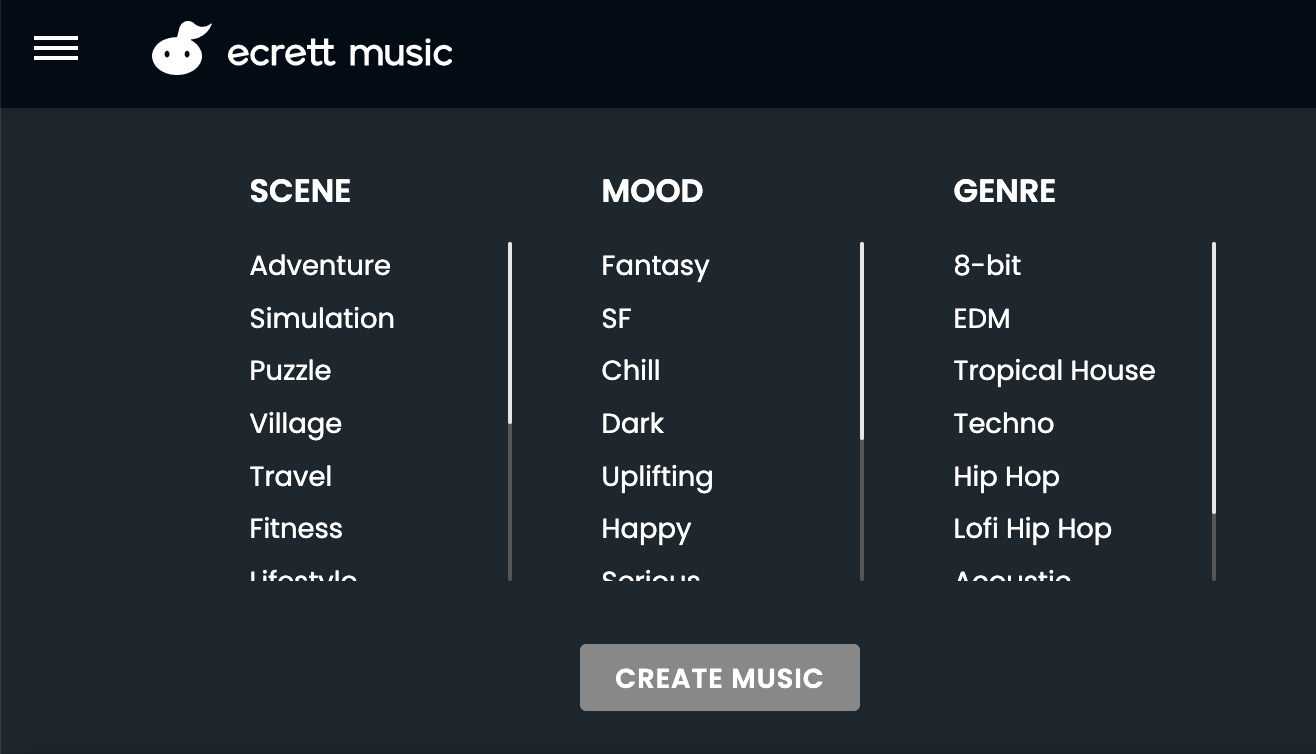
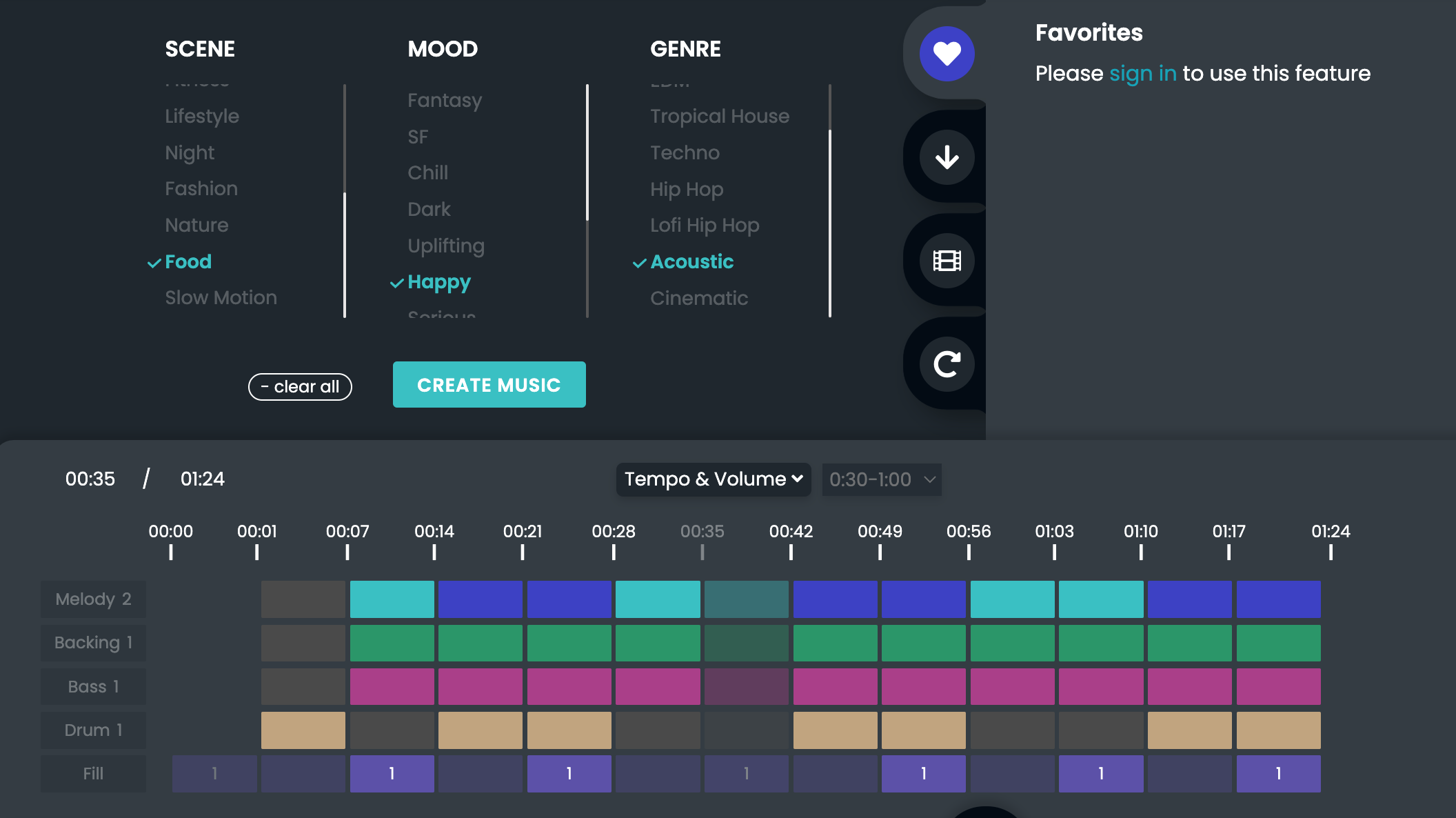
Pros
- Easy to use
- Affordable way to make AI tracks
- Straightforward editing options
- Great for creating royalty-free tracks fast
Cons
- Fewer moods, scenes, and genres than Soundraw
If you like using Soundraw but want a cheaper option, Ecrett is a good bet. The two companies are connected, but Ecrett is more affordable at $7.99/month for the Personal plan or $24.99 for the Business plan.
9. Fadr
A lot of AI music makers will give you a track for free but charge if you want the stems. Fadr uses AI to extract stems from any piece of music. It can also extract the melody, key, tempo, and chord progressions and provide these as MIDI files.
Fadr is also really good at making remixes or mashups of different songs. It uses AI to handle the synchronization of key changes and tempo for the transitions.
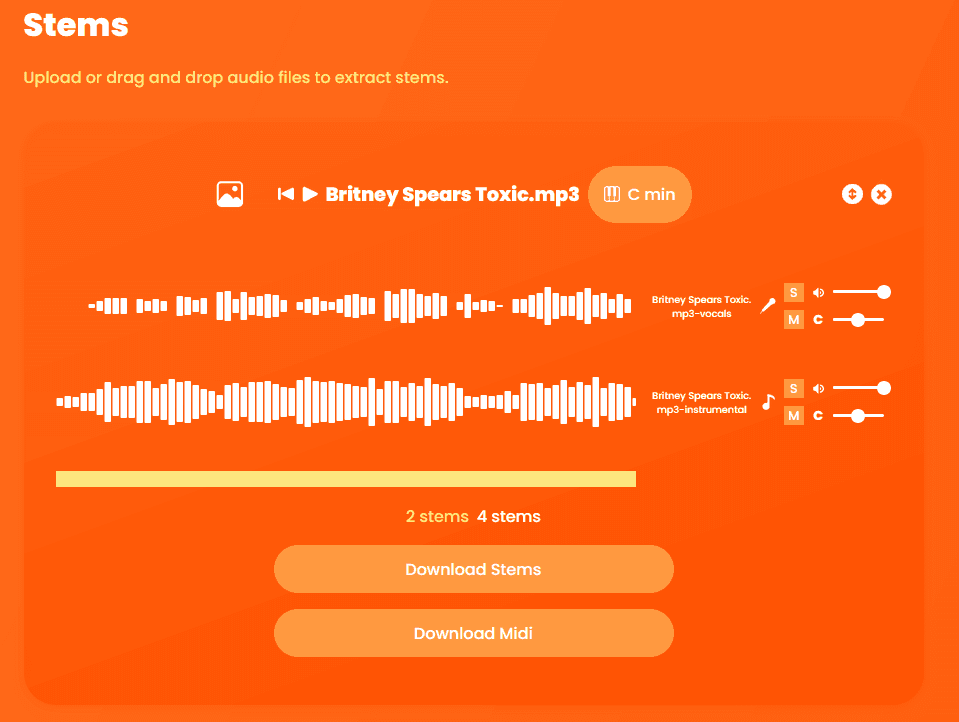
Pros
- Free unlimited stem separation
- Great for remixing or mashups
- Paid plans allow for lossless WAV downloads
Cons
- No info on license rights
If you’re looking to extract stems from music for Karaoke tracks or your own original songs, then this tool is amazing. The free version will be all that most users need. The $10/month plan offers lossless WAV downloads or storage on their servers.
10. Orb Producer Suite
Orb supplies plugins and a full suite of professional AI music tools. If you’re a DJ, a recording studio, or a musician producing music for film, this is the level of AI music tool you are looking for.
This powerful AI tool will deliver suggestions for chord progressions, melody ideas, bass lines, and arpeggios. It allows you a high degree of control over your tracks with dozens of professionally made presets to get you started.
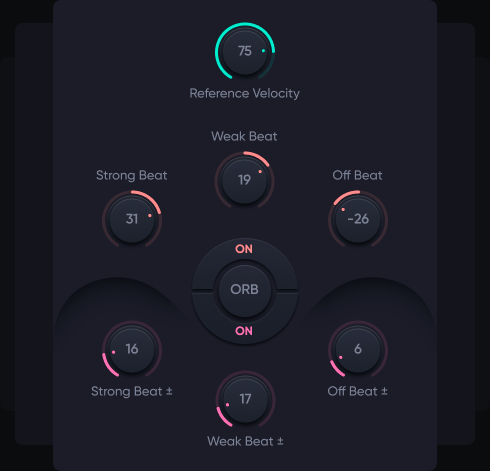
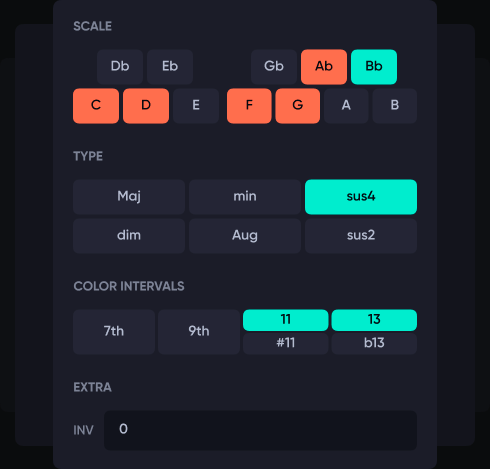
Pros
- Professional AI music tool
- Very high degree of AI editing tools
- Will work perfectly with all DAWs except Protools
Cons
- Steep learning curve
The software needs to be downloaded, and at a purchase price of €99, it would really only appeal to professional musicians and producers.
11. Algonaut
If you have been making electronic music for a few years, you’ve probably built up a collection of thousands of samples. Algonaut is a professional music AI tool that sifts through your samples so you can find what you’re after in an instant. It has a great sample editor, too.
It will also suggest samples that fit contextually with the piece of music you’re working on. Algonaut is great for creating drum kits, and the drum sequencer makes it easy to come up with rhythm ideas. You can choose from your sample library or let the AI generate some new ones for inspiration.
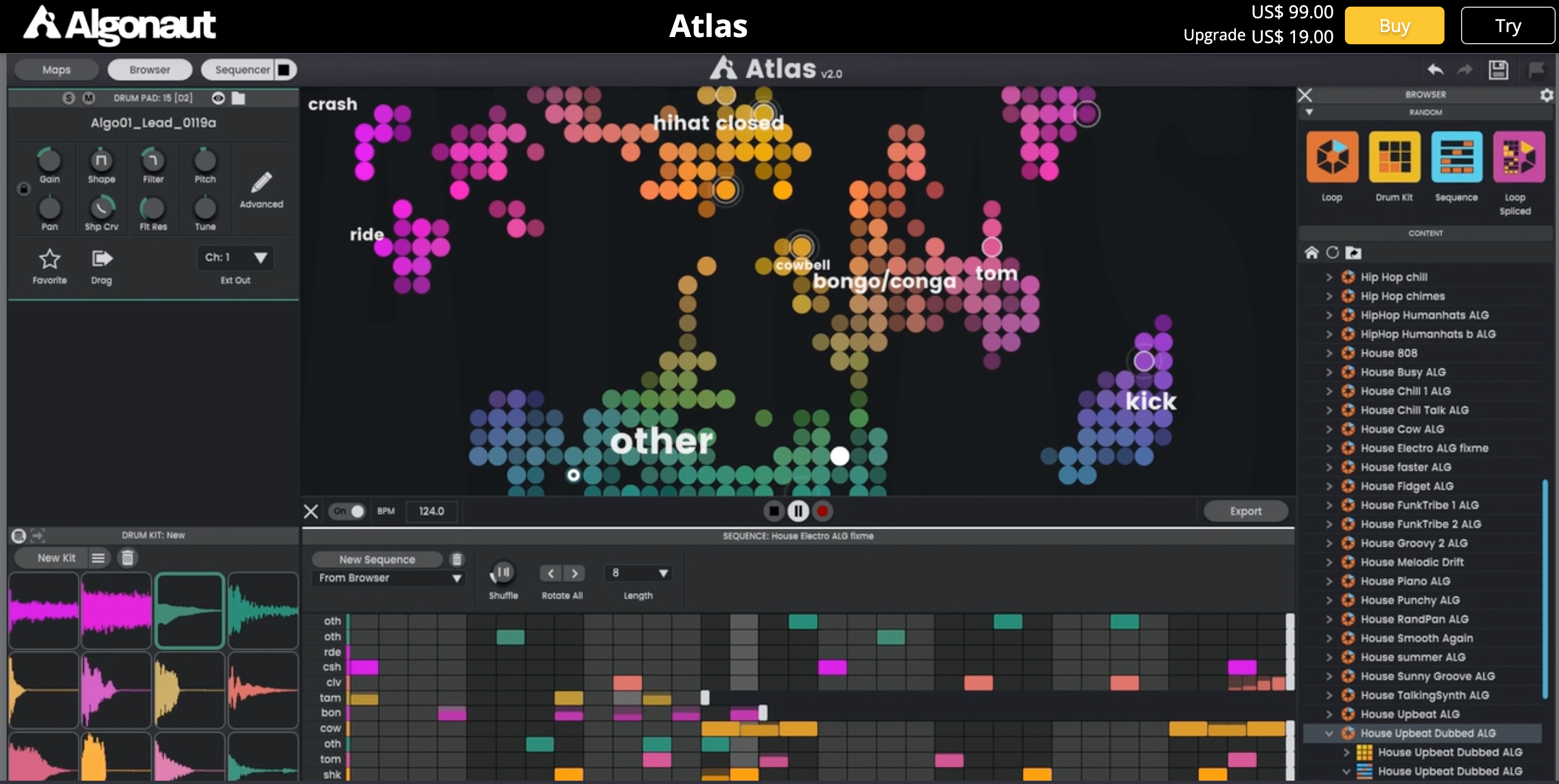
Pros
- Saves a lot of time by mapping your samples
- Creates drum kits fast
- Accepts all major file formats of your MIDI files
Cons
- Not a good tool for beginners
The downloaded software costs $99 and is worth it just in the time it saves you wading through your samples. The customization and sound deck hardware compatibility make this a great tool for pro electronic musicians to make the best AI music they can.
Are AI music tools the future of royalty-free tracks?
AI music tools will be producing more and more of the royalty-free background music you hear in YouTube videos and on social media. The fact that these tracks are license and royalty-free and so easy to make is hard to ignore. And a lot of the AI music sounds really good.
The tools we reviewed above are some of the best AI music generators out there, and they’re very useful. But to get something really good out of them, you need to be musically and technically competent. If anything, instead of replacing musicians, these tools will push them into new creative directions and shorten production times.
Musicians like Arca, Holly Herndon, and Toro y Moi have already been using AI in their music creative processes. AI will likely be adopted by more musicians once they reconcile their desire for creative integrity with the obvious usefulness of these tools.
The AI music generators we reviewed have different musical functions, but in one way or another, they all serve the same purpose. Make music faster. When musicians aren’t bogged down with laborious production and audio quality tasks or stuck for inspiration, they can spend their mental resources on being creative.
That’s probably the real reason AI will be responsible for better music being produced in the future.
What are the drawbacks of AI-generated royalty-free music?
The main drawback when you create royalty-free music is the lack of true originality and emotional depth that you get from music produced by a human. When it’s easy to compose music by pressing a button, we get creatively lazy.
The ethics of AI regarding the data sets these tools are trained on are the subject of heated debate, too. The music already created by artists is being used to train software that threatens their livelihood in many ways. Even royalty-free background music essentially has its roots in music that is protected by copyright.
The utility of AI in music creation is undeniable, but let’s hope it’s used as a creative assistant and not a replacement for the artist. As more AI music makes its way into commercial music played on the airwaves, it could be our musical tastes that become trained rather than the AI.
FAQs
How much does an AI music generator cost?
Most AI music tools have free plans for personal use. The paid plans are usually subscription-based and are between $5 and $25 per month. Professional AI software is normally available for a one-off payment of around $99.
What are the pros of using AI-generated music tools?
These tools shorten the creative process and can provide inspiration for new music. Most AI music is royalty and license-free, which makes it easier to use in commercial applications.
What are the cons of using AI music generators?
AI music doesn’t have the creative and emotional depth that you get from music produced by humans. The output from these tools can sound pretty bad sometimes, so it can be a hit-or-miss process to get something good.
Inge von Aulock
I'm the Founder & CEO of Top Apps, the #1 App directory available online. In my spare time, I write about Technology, Artificial Intelligence, and review apps and tools I've tried, right here on the Top Apps blog.
Recent Articles
Introduction AI art prompts are no longer a novelty; they’re a game-changer in the art world. Harnessing the power of AI to...
Read MoreIntroduction AI Art Generators are no longer a novelty. They’re a game-changer. In 2024, they’ve become the secret weapon for artists worldwide,...
Read MoreIntroduction Adobe Express AI isn’t just another tool in your design arsenal. It’s a game-changer. In the realm of design, where creativity...
Read More